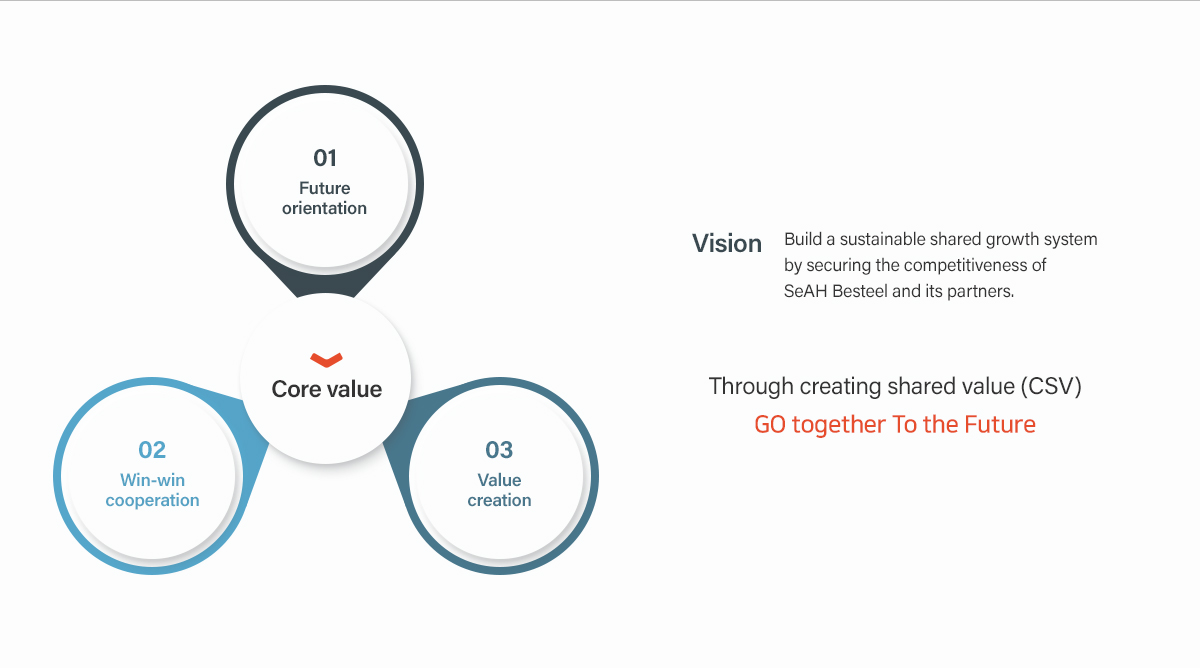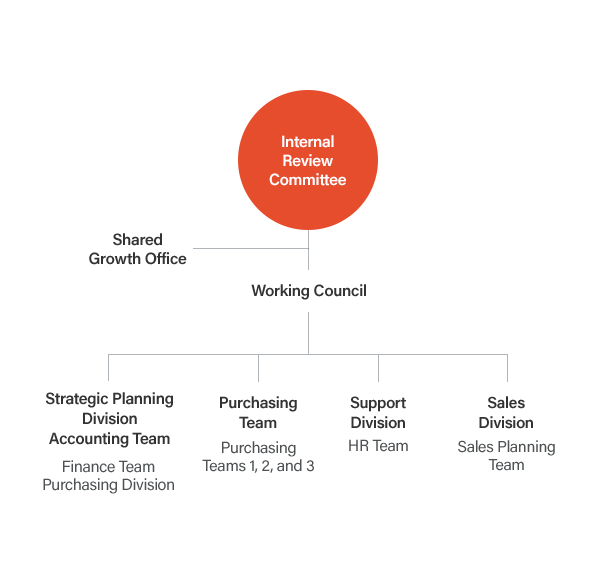
Sustainability Management
Sustainable Supply Chain Management
SeAH Besteel has established the following standards for its suppliers to establish a safe working environment, ensure workers' respect and dignity, and operate an eco-friendly and ethical business.
Third Party Code of Conduct
SeAH Besteel has established Code of Conduct, highlighting SeAH Group’s strong commitment to working together for sustainable growth.
SeAH Besteel, along with various third-party partners dealing with SeAH Besteel, intends to become a "business that makes the world more beautiful" by abiding by this Code. This code is based on the Responsible Business Alliance (RBA) Code of Conduct, a global standard for ethical business practices. In the event of any conflict between local regulations and the content of this code, we adhere to the stricter standards.
01 Labor Human Rights
Suppliers must protect and respect the human rights of all members. This applies to all types of employees, including temporary employees, migrant employees, interns and dispatched employees, etc. Further, all employees must be guaranteed lawful employment and rights as prescribed by local laws.
① Voluntary Employment
② No Child Labor
③ Compliance with Working Hours
④ Wages and Benefits
⑤ Humane Treatment
⑥ Non-Discrimination
⑦ Freedom of Association
02 Safety and Health
Suppliers shall recognize that the safety and health of employees are essential to all activities performed in connection with the company's business. In addition, suppliers shall exert efforts to provide employees with a safe and clean working environment in accordance with local laws and regulations.
① Industrial Safety
② Emergency Precautions
③ Industrial Accidents and Diseases
④ Industrial Hygiene
⑤ Physical Burden
⑥ Safety Management of Dangerous Machinery, Instruments and Equipment
⑦ Hygiene, Food and Housing
⑧ Safety and Health Education
03 Environment
Suppliers shall manage greenhouse gases, air pollutants, wastes, recycling, industrial water reuse and chemicals, etc. in compliance with laws and regulations on environmental protection. Also, suppliers shall identify the environmental impact of its manufacturing process, and protect public safety and health by minimizing negative impact on the community, environment, natural resources, etc.
① Obtaining Environmental Permits
② Prevention of Contamination and Reduction of Resource Use
③ Hazardous Substances
④ Waste Management
⑤ Control of Air Pollutants
⑥ Substance Regulatory Compliance
⑦ Water Resource Management
⑧ Energy Consumption and Greenhouse Gas Emissions
⑨ Animal Welfare
04 Ethics and Fair Trade
Suppliers shall comply with all local laws and regulations for social responsibility and sustainable co-existence, and strive to improve its ethics standards.
① Integrity
② Prohibition of Undue Profits
③ Disclosure of Information
④ IP Protection
⑤ Privacy
⑥ Fair Trade, Advertising and Competition
⑦ Identity Protection and Non-Retaliation
⑧ Responsible Material Management
⑨ Export Restrictions and Economic Sanctions Compliance
⑩ Anti-Money Laundering and Tax Evasion
⑪ Conflicts of Interest
05 Management System
Suppliers shall establish and continuously improve a management system to comply with the laws and regulations applicable to this Code, comply with customer demands, comply with this Code, and identify risks and opportunities associated with this Code.
① Compliance Pledge
② Management's Duties and Responsibilities
③ Legal and Customer Requirements
④ Risk Management
⑤ Improvement Objectives
⑥ Training
⑦ Communications
⑧ Member Feedback, Participation and Grievance Handling
⑨ Audit and Evaluation
⑩ Corrective Process
⑪ Documents and Records
Purchasing Strategy
Based on the philosophy of shared growth, SeAH Besteel focuses on supply chain management for win-win situations and pursues fair trade and pro-social purchasing policies. In particular, in a rapidly changing environment, it has promoted a purchasing strategy that strengthens the supply chain's intrinsic purchasing competitiveness while also securing supply stability through supply chain internalisation and diversification. Furthermore, it has established standards for sustainable purchasing strategies and, as a result, a system that responds flexibly to the external environment, enhancing its purchasing response capabilities.
01
Supply Chain Management for Shared Growth
A sustainable purchasing strategy that coexists with the supply chain is critical. In addition to providing win-win support measures, selecting and rewarding excellent suppliers, and conducting regular face-to-face meetings, SeAH Besteel's supply chain management goes beyond support measures such as training and joint response to various risks to further grow as a business partner and includes a consulting concept.
02
Pro-social Purchasing Policy
SeAH Besteel pursues a pro-social purchasing policy. It manages the country of origin intensively for minerals with conflict risks in order to prevent risks from arising in advance. Furthermore, SeAH Besteel promotes pro-social purchasing policies, such as preferential trade benefits for ESG companies and various certified companies, such as ISO.
03
Ethical Management and Fair Trade
SeAH Besteel fulfils its responsibilities and efforts in fair trade on the basis of ethical management, so that all procedures, from bidding to delivery and settlement, can be managed transparently. All of its core partners have signed an ethics pledge to end unethical trading practices.
04
Increasing Intrinsic Purchasing Competitiveness
SeAH Besteel is increasing its purchasing competitiveness by improving strategic purchasing through price forecasting using data, discovering new sources of supply, and co-developing new items.
05
Securing Supply Chain Stability
SeAH Besteel promotes supply chain internalisation and diversification to ensure supply chain stability in a rapidly changing external environment. It is proactively managing risks in the supply chain for all items, not just raw materials, to support a smooth production process.
06
Organisation operated in an agile manner with flexible responses
SeAH Besteel is pursuing a purchasing strategy based on the existing purchasing organisation that allows it to respond intensively to changes in the external environment and major issues by operating a flexible organisation such as a project TFT or matrix organisation.
Responsible Minerals
SeAH Besteel adheres to the principle of not using industrial minerals derived from conflict areas in its products.
SeAH Besteel produces no conflict minerals (tin, tantalum, tungsten, or gold) in its special steel and large forgings.
Subject
Responsible minerals are minerals mined on the basis of social responsibility in order to prevent them from being used to fund wars and to protect human rights and the environment, a concept that extends beyond conflict minerals.
[Responsible minerals]
Conflict minerals (3TG): tin, tantalum, tungsten, and gold
Conflict areas (10 countries): DRC, Republic of the Congo, South Sudan, Rwanda, Brundi, Uganda, Zambia, Angola, Tanzania, and Central Africa
In addition to ① and ②, the concept includes minerals from areas where human rights violations occur
[Related regulations]
USA: Dodd-Frank Wall Street Reform and Consumer Protection Act (July 2010)
Europe: EU Conflict Minerals Regulation (May 2017)
[Countries covered by conflict minerals]


Policy
SeAH Besteel has included a clause prohibiting the use of illegally mined raw materials in its Purchasing Policy, Supplier Code of Conduct, and Purchasing Standard Contract, which were established in 2016.
It takes part in CFSI (conflict-free sourcing initiative) activities such as due diligence, reporting, and smelter consultation.
Ensuring that no responsible minerals are added to the products it produce, including obtaining conflict mineral-free certificates.
Process
SeAH Besteel recognises human rights violations and environmental destruction caused by the mining of minerals from conflict areas as serious problems. Therefore, SeAH Besteel is continuously improving its responsible mineral management process to comply with laws and regulations related to responsible minerals and fulfil its social responsibility.
Planned supply chain management activities upon receipt of responsible minerals such as tin and tungsten
- Apply the OECD "Supply Chain Due Diligence Framework"
- Conduct due diligence surveys on purchases
- Check smelter status through the EICC conflict minerals reporting template
Continuous monitoring and review of responses when new minerals become controversial

Process
SeAH Besteel recognises human rights violations and environmental destruction caused by the mining of minerals from conflict areas as serious problems. Therefore, SeAH Besteel is continuously improving its responsible mineral management process to comply with laws and regulations related to responsible minerals and fulfil its social responsibility.
Planned supply chain management activities upon receipt of responsible minerals such as tin and tungsten
- Apply the OECD "Supply Chain Due Diligence Framework"
- Conduct due diligence surveys on purchases
- Check smelter status through the EICC conflict minerals reporting template
Continuous monitoring and review of responses when new minerals become controversial
Direction for the future
Currently, SeAH Besteel does not use responsible minerals; however, it will continue to monitor the mineral purchases of its suppliers and expand to secondary suppliers in the future to ensure that the policy of not using responsible minerals is established. SeAH Besteel also plans to establish a communication channel between stakeholders in case controversies arise over minerals handled by it in the future.
Shared Growth
SeAH Besteel strengthens the competitiveness and partnership of its suppliers
by promoting policies and supporting programmes for shared growth in the future.


Organisational Structure
To promote shared growth and strengthen competitiveness with its suppliers, SeAH Besteel has gradually expanded its shared growth programmes. It will continue to strive to grow alongside its suppliers by faithfully implementing fair trade agreements for mutual growth and developing and implementing numerous programmes to assist them.

Subcontracting Practices
| Title | Attachment |
|---|---|
| Implement fair trade from the contract signing stage to the execution stage by introducing and operating desirable contract signing practices between large, medium, and small companies. | |
| Adopt and comply with practices for fair selection (registration) of suppliers to ensure fair and objective selection and operation (registration and change) of suppliers. | |
| Adopt and implement practices for establishing and operating an internal review committee for subcontracting transactions to establish a prevention-in-advance and audit system for unfair trade practices. | |
| Adopt and implement practices for desirable document issuance and preservation in order to establish document issuance and preservation practices in subcontracting transactions. |
Reports and Suggestions
We appreciate your feedback. We welcome suggestions for improvement during transactions as well as reports of unfair trade practices, unfair subcontracting practices, and so on, so that improvement activities can be carried out. Suggestions and reports will not be shared with third parties, and the confidentiality of those contacted will be strictly maintained
Make a suggestion or write a report.